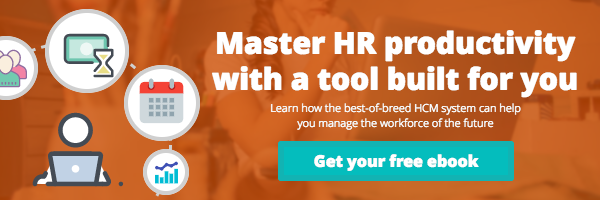
A human resources business partner (HRBP) is a critical member of the HR team, helping the organization drive business strategy through an array of HR programs and activities.
Depending on your strategic objectives and the needs of your workforce, having an HR business partner can help you advance your HR agenda and run an even more successful HR function. But what exactly does an HRBP do, and how do you know if your organization needs one?
What is an HRBP?
An HRBP is a senior HR professional who delivers talent management programs and services in alignment with organizational goals. The HRBP works with organizational leaders across all company functions and supports workforce management activities on a strategic and tactical level.
Because of their impact across several levels of the organization, HRBPs are in a critical position to act as change agents, mediators, problem solvers, and advisors to managers and employees alike. Key job responsibilities of the HR business partner role include:
- Working with business leaders to understand talent requirements and create an efficient process for recruiting and onboarding talent.
- Analyzing metrics and data to support strategic planning and workforce decision-making.
- Evaluating the effectiveness of training and development programs to build talent bench strength and succession plans.
- Establishing employee rewards and recognition programs to drive employee performance and engagement.
Supported by a clear approach and a capable person in the position, the HRBP role can deliver measurable value in an organization. According to Gartner research, organizations that build high-performing HRBPs can improve employee performance by up to 22 percent and employee retention by up to 24 percent.
How an HRBP Differs from Other HR Roles
Though the HRBP role can vary in both title and responsibilities along the strategic-tactical continuum, specific attributes of the role differentiate it from others on the HR team. For example, HR business partners are typically not specialists. They are often generalists who impact all areas of HR strategy and are more likely to operate at the hub of a center-of-excellence model. They often impact talent management programs across all the HR disciplines and rarely focus on compensation, recruitment, or benefits alone.
The HR business partner role can also have broad vertical impact in an organization, which is one of the many reasons the role was called “the hottest job in HR” by researchers at the Institute for Corporate Productivity (I4CP). One day, an HRBP could be coaching senior leaders to resolve a team-related conflict. And on the next day, the HRBP could be facilitating a focus group with individual contributor employees.
HRBPs also differ from traditional HR manager and HR director roles. For example, the key HRBP job responsibility is not managing other functions of HR or enforcing HR compliance standards across the organization. Instead, the HRBP is chiefly responsible for embedding into the workforce, helping managers and employees, and identifying solutions to build employee engagement and performance.
How to Know If You Need an HRBP
Depending on your organization’s business and HR strategy, an HR business partner may be the ideal role to round out your HR function. For example, if you have an HR manager and some specialists to support areas such as compensation and benefits, an HRBP may be the logical next hire to help you identify and implement improvements across all areas of workforce management.
Determining if and when you need an HRBP on your team may be challenging, particularly if the concept of an HRBP is new to you. To guide your decision, here are some questions you can ask:
Do we need help transforming our company values into action?
A great HRBP can partner with company leaders and members of the HR team to create a culture that has your values at its foundation.
Do our company managers need help leading others?
HRBPs are in a unique position to coach and counsel managers on people management. Although they are from HR, they are also embedded in the daily life of the business, providing them with a unique perspective and ability to guide managers in resolving people leadership issues.
Do we need help developing a plan for upskilling the workforce?
An HRBP can work with company leaders and members of the HR team to design a plan that will help employees develop critical skills for future success.
Do we need new solutions to keep employees engaged?
An HRBP can develop a roadmap to boost engagement through a variety of HR programs and activities.
Does the HR team need help translating workforce metrics into impactful HR programs and activities?
HRBPs can identify the technology and tools that can analyze workforce data for better decision-making and planning.
Boost the Effectiveness of Your HR Team
Operating a productive HR function requires you to not only think about your current needs but also the future needs of your organization and workforce. An HRBP role may be the critical component you need to make bigger strides in improving the overall effectiveness of your HR initiatives and activities.
A capable HRBP can build fruitful relationships across the entire organization and help you leverage today’s technology for better data-driven decision-making. For more tips, read our nine-part productivity series, “How an HCM System Can Improve Productivity for HR.”

